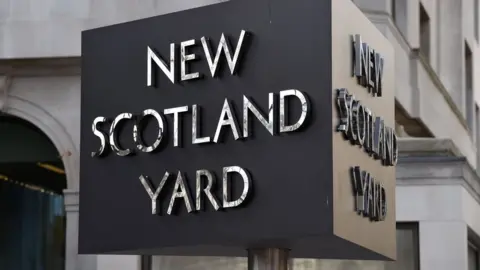Anti-apartheid London protest convictions could be quashed
 PA Media
PA MediaAnti-apartheid protesters could be able to appeal against their convictions after an undercover Met Police officer was found to be among them.
The three people took part in a protest in London in 1972, involving a coach carrying the England rugby union team.
A Criminal Cases Review Commission (CCRC) investigation has revealed "egregious" misconduct by police.
The Met says it is aware of the findings and it would inappropriate to comment further.
"The Met welcomes the scrutiny of the Undercover Policing Inquiry (UPI), and will continue to co-operate fully with it," the force added.
The CCRC has now referred the convictions back to court, saying there is a "real possibility" they will be quashed.
Its decision comes after it received new information from the UPI, set up in 2015 to examine undercover policing in England and Wales since 1968.
The inquiry found the Metropolitan Police failed to reveal the participation of an undercover officer from the Special Demonstration Squad to the prosecutor or court.
Officer unknown
A group of protesters from the Putney Young Liberals took part in a demonstration on 12 May 1972, which was meant to disrupt the departure of a coach carrying the England rugby union men's team from the Star and Garter Hotel in Richmond, south-west London, ahead of a tour of South Africa.
At that time, South Africa was under the apartheid regime, which saw a raft of laws used to rigidly, and often brutally, enforce the separation of whites and blacks.
A total of 14 people were arrested and charged after sitting in the path of the coach, and 13 were convicted following trials at Mortlake Magistrates' Court.
However, the inquiry discovered that one member of the group was an undercover officer, known as HN298, who had protested alongside them.
He was arrested at the scene under his assumed name, but the fact that he was a police officer remained unknown to the court or his fellow defendants.
The officer continued to participate in group defence discussions and report back to the police, and the CCRC said this breached the confidentiality between his co-defendants and their lawyers.
'Legal rights breached'
Helen Pitcher, chairman of the CCRC, said: "During our investigation we have seen evidence of deliberate and persistent non-disclosure by the police which was sanctioned by senior officers.
"The court was misled, and the defendants' basic legal rights were breached.
"In our view, the misconduct by the police in this case was so egregious that a judge in possession of all the facts would have decided it was necessary to halt proceedings in order to protect the integrity of the criminal justice system.
"Although these convictions date back a long time, issues around public confidence in the police and our wider public institutions are always important.
"Old convictions can also have an enduring impact on the lives of the individuals concerned."
The three cases will now be considered by Kingston-Upon-Thames Crown Court, relating to one person convicted of obstructing the highway, and two convicted of obstructing the highway and obstructing police.

Follow BBC London on Facebook, Twitter and Instagram. Send your story ideas to [email protected]
